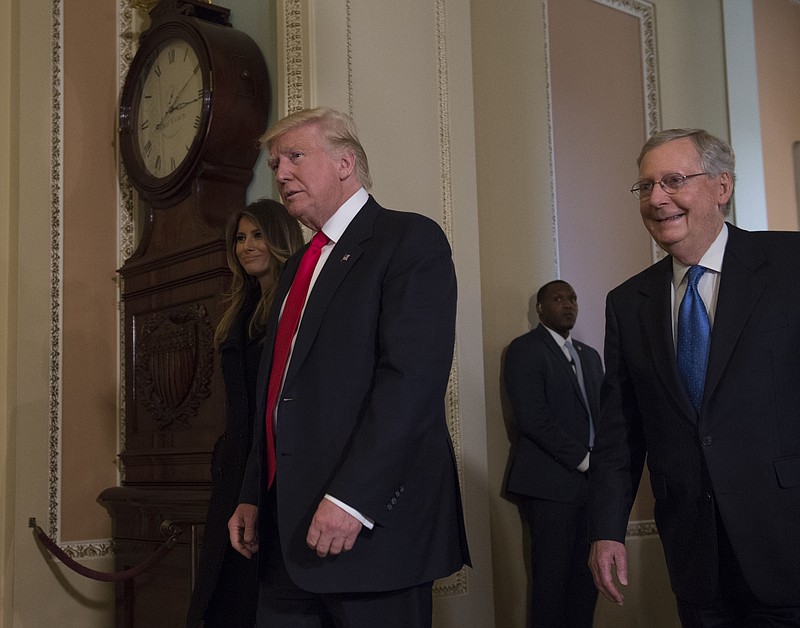WASHINGTON (AP) - A long list of Senate Democrats who face re-election in 2018 are from states Donald Trump won or nearly won on Election Day. That could mean a politically excruciating next two years for many of them, and for party leaders trying to chart a legislative path as the new age of Trump.
The election two years from now had already looked difficult for Senate Democrats, who must defend 25 seats compared to just eight held by Republicans. The Democrats' list includes two independents, Vermont's Bernie Sanders and Maine's Angus King, who align with them.
Of those 25 senators, 13 are from states Trump captured or narrowly lost. Among those are Maine, Michigan, Pennsylvania and Wisconsin, which hadn't backed a GOP presidential candidate since the 1980s, leaving both parties trying to discern how much Tuesday may have reordered the lineup of blue, red and swing states.
Five Democrats are from states Trump easily carried, by 19 percentage points or more - Indiana, North Dakota, West Virginia, Missouri and Montana.
"They should be terrified," Ward Baker, executive director of the National Republican Senatorial Committee, the Senate GOP's political organization, said of the Democrats.
Republicans are expected to control the Senate next year 52-48, including a Louisiana runoff in December the GOP is expected to win. With Democrats able to use filibusters to force the GOP to secure 60 votes on major issues, likely new Senate Minority Leader Chuck Schumer, D-N.Y., should often be able to block Republicans, especially on issues Democrats broadly support such as consumer protection and curbs on Wall Street.
But it will probably be harder for Schumer to keep Democrats together on issues crucial to conservative voters including the Supreme Court, abortion, guns and weakening the Environmental Protection Agency. Some Democratic senators could also be drawn to Trump's efforts to revamp portions of President Barack Obama's health care law and tighten curbs on immigrants in the U.S. illegally.
Senate Majority Leader Mitch McConnell, R-Ky., told reporters in Louisville on Friday that he believes Democratic senators from deeply Republican states are "going to want to be cooperative with us on a variety of things."
Sen. Richard Durbin of Illinois, the No. 2 Democratic leader, said that as his party's vote counter he's long listened to concerns of senators from Republican-leaning states.
"I know a half-dozen people, I think that list will get a little longer now, that I go to first to find out where senators are on issues," he said.
At the same time, Schumer must try to satisfy his party's liberals, who include Sanders and Elizabeth Warren of Massachusetts.
On some issues, perhaps efforts to expand coal use, Schumer could see up to seven Democrats defect to the GOP and still keep Republicans short of the 60 votes needed to prevail.
"I'd probably line up more with Donald Trump's economic package," said Democratic Sen. Joe Manchin, seeking re-election next year from West Virginia. "I sure don't adhere to his social rhetoric."
In some ways, Clinton's defeat made political decisions easier for senators facing 2018 re-election.
That's because midterm elections, when a president is not on the ballot, are often cruel to the president's party in Congress. Democrats lost nine Senate seats in 2014 and six others in 2010 under Obama, and presidents' parties have gained Senate seats just once in the past eight midterm contests.
Democrats had already been privately fretting over how to persuade some of their senators to back Clinton initiatives that could have been unpopular in GOP-leaning states. The Trump victory and retention of congressional control makes it easier for Democrats to blame the GOP for problems.
"The onus is on Donald Trump and Republicans, who now own all of the federal government," said Sen. Debbie Stabenow, D-Mich., whose term is up in 2018. Her state's presidential vote remained too close to call Friday.
All of that - plus voters' disgust with the Washington establishment - could put pressure on congressional Republicans for achievements, which may require them to cut deals with Schumer or with Democrats they hope to pick off from Trump states.
"I think everybody is saying, 'We have to put something on the board here to restore some of our credibility,'" said Patrick Griffin, a former Senate Democrat aide and White House official under President Bill Clinton.
But in the 2018 campaigns, Republicans are sure to come after Democrats from states Trump won, using votes they take over these next two years that might displease conservative voters.
In one indication of hardball politics, Baker - the chief of the Senate GOP political committee - told reporters this week that "We're not done yet with Evan Bayh," the former Democratic Indiana senator who lost a bid this week to return to the chamber. Baker offered no specifics but said Republicans had more research material on Bayh that they still wanted to use.
